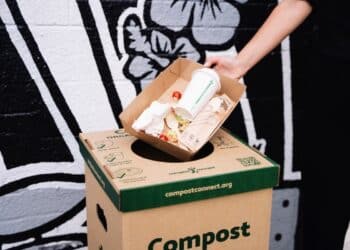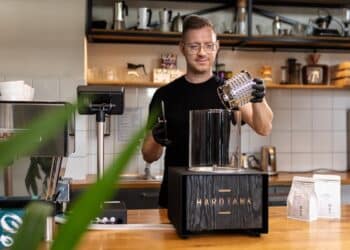How IMF’s roasting machines are making the process cleaner and greener for Australia’s coffee roasters.
With the coffee market so closely linked with the effects of climate change, creating a sustainable business is a priority for many of Australia’s specialty coffee roasters. Roastquip, the exclusive Australian distributor of IMF roasting machines, helps roasters realise this ambition with efficient, emissions-reducing equipment.
“When purchasing new equipment, running costs and the environmental impact are some of the most important factors for roasters,” says Will Notaras, Founder of Roastquip.
“They are looking for ways to reduce their emissions while also reducing their energy usage, which is becoming increasingly expensive. Generally, we now have a more environmentally aware customer base.”
IMF specialises in producing low-emissions roasting equipment that delivers energy savings for its users. Its RM range, which comes in sizes from six to 480 kilograms, features technology designed to make coffee roasting as environmentally conscious as possible.
Its headline feature is its recirculating heat technology, which saves more than 30 per cent in gas usage and produces fewer greenhouse gas emissions compared to conventional roasters fitted with a separate afterburner.
“Conventional roasters have a burner heating the drum and another separate afterburner to incinerate the smoke, which will exit the flue as hot air. IMF roasters, on the other hand, have only a single burner that does the job of both by simultaneously heating the beans and incinerating the emissions using recirculating heat technology pioneered by IMF,” says Will.
“Once the emissions have been incinerated in the combustion chamber at high temperature, the machine uses its unique vortex and equalizer technology to automatically modulate the vortex valve at hundreds of calculations per second. It mixes ambient air into the hot air stream to ensure the clean recirculating heat is at the precise temperature inside the drum to one degree of accuracy. The equalizer also ensures heat is evenly spread across the entire bean mass inside the drum.”
This process means that the machine saves users a minimum of 30 per cent gas usage, but Will says the savings are much higher because of its ability to roast four true batches per hour.
“With a lot of conventional roasters, you have to wait several minutes between batches to allow the temperature to get back to the desired level, resulting in only achieving approximately three batches per hour,” he says.
“That’s not the case with an IMF roaster, which gets back up to temperature very quickly while controlling the heat very accurately. This reduced wait time decreases gas consumption and results in a true four – potentially five for specialty coffees – batch per hour roasting rate, adding a further 25 per cent increase in productivity.”
Another benefit of the temperature accuracy of IMF machines, according to Will, is the consistent results they produce.
“Whether it’s the first or last roast of the day, the IMF will produce the same coffee batch after batch,” he says.
“This is particularly useful when trialling a new profile. Because you can control the temperate so accurately, most roasters only need to do one or two roasts on the IMF, make their modifications, and then they’re much closer to where they want to be. Other roasting machines could take several attempts to get it to the desired profile. This not only saves time and gas but also bean wastage.”
Will highlights that IMF roasters also enable the user to make quick changes to the recipe in real-time using the manual override function.
“When developing new profiles for blends or single origins, this allows the user to customise roasting profiles very quickly while the operator is roasting the coffee, instead of having to wait for the batch to finish and making the changes on the next roast,” he says.
Its other time-saving features include an automatic preheating profile, which sounds a reminder alarm when the roaster has been warmed up for the precise amount of time and is at the ideal temperature to begin roasting.
“It may seem like a small thing, but over a year that gas consumption adds up if the timing is not monitored,” says Will.
IMF also manufactures blenders and silos that automatically pre- or post-blend the coffee while the operator is roasting, eliminating manual handling and increasing productivity.
“IMF recirculating heat roasters have been widely praised for their fuel efficiency and ability to roast in fast times if required,” says Will, “while also producing exceptional quality and consistent coffee – batch after batch.”
For more information, visit roastquip.com.au or imf-srl.com/en/
This article appears in the April/May 2025 edition of BeanScene. Subscribe HERE.




